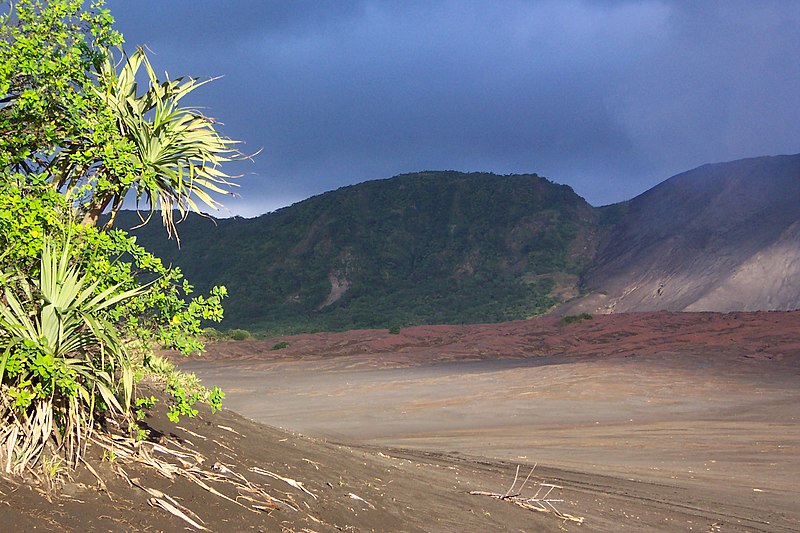Difference between revisions of "Adopting from Vanuatu"
m (→About Vanuatu) |
|||
| Line 21: | Line 21: | ||
=About Vanuatu= | =About Vanuatu= | ||
| − | Multiple waves of colonizers, each speaking a distinct language, migrated to the New Hebrides in the millennia preceding European exploration in the 18th century. This settlement pattern accounts for the complex linguistic diversity found on the archipelago to this day. The British and French, who settled the New Hebrides in the 19th century, agreed in 1906 to an Anglo-French Condominium, which administered the islands until independence in 1980, when the new name of [[Vanuatu]] was [[adopted]]. Source: | + | Multiple waves of colonizers, each speaking a distinct language, migrated to the New Hebrides in the millennia preceding European exploration in the 18th century. This settlement pattern accounts for the complex linguistic diversity found on the archipelago to this day. The British and French, who settled the New Hebrides in the 19th century, agreed in 1906 to an Anglo-French Condominium, which administered the islands until independence in 1980, when the new name of [[Vanuatu]] was [[adopted]]. Source: www.cia.gov/library/publications/the-world-factbook/geos/nh.html |
| − | + | ||
=Hague Convention Information= | =Hague Convention Information= | ||
Revision as of 03:10, 24 February 2018
Notice: As of July 14, 2014, all individuals and agencies facilitating international adoptions must be in compliance with the Intercountry Universal Accreditation Act.
The information contained on this website is for educational purposes only and is not intended to be a substitute for professional legal advice. Always seek the advice of a licensed and qualified professional. While the content of this website is frequently updated, information changes rapidly and therefore, some information may be out of date, and/or contain inaccuracies, omissions or typographical errors.
Contents
About Vanuatu
Multiple waves of colonizers, each speaking a distinct language, migrated to the New Hebrides in the millennia preceding European exploration in the 18th century. This settlement pattern accounts for the complex linguistic diversity found on the archipelago to this day. The British and French, who settled the New Hebrides in the 19th century, agreed in 1906 to an Anglo-French Condominium, which administered the islands until independence in 1980, when the new name of Vanuatu was adopted. Source: www.cia.gov/library/publications/the-world-factbook/geos/nh.html
Hague Convention Information
Vanuatu is not party to the Hague Convention on Protection of Children and Co-operation in Respect of Intercountry Adoption ( Hague Adoption Convention ). Therefore, when the Hague Adoption Convention entered into force for the United States on April 1, 2008, intercountry adoption processing for Vanuatu did not change. The U.S. Embassy in Port Moresby, Papua New Guinea, has responsibility for the well-being of U.S. citizens in Vanuatu.
Who Can Adopt
To bring an adopted child to United States from Vanuatu, you must be found eligible to adopt by the U.S. Government. The U.S. Government agency responsible for making this determination is the Department of Homeland Security, U.S. Citizenship and Immigration Services (USCIS). To learn more please read about Who Can Adopt from Vanuatu.
Who Can Be Adopted
Vanuatu has specific requirements that a child must meet in order to be eligible for adoption. You cannot adopt a child in Vanuatu unless he or she meets these requirements.
In addition to these requirements, a child must meet the definition of an orphan under U.S. law for you to bring him or her back to the United States. Learn more about these U.S. requirements.
How to Adopt
Adoption Authority
Ni-Vanuatu Courts
The Process
The process for adopting a child from Vanuatu generally includes the following steps:
- Choose an Adoption Service Provider
- Apply to be Found Eligible to Adopt
- Be Matched with a Child
- Adopt the Child in Vanuatu
- Apply for the Child to be Found Eligible for Adoption
- Bring Your Child Home
To learn more about this process please read How to Adopt from Vanuatu.
Traveling Abroad
Applying for Your U.S. Passport
A valid U.S. passport is required to enter and leave Vanuatu. Only the U.S. Department of State has the authority to grant, issue, or verify U.S. passports. Getting or renewing a passport is easy. To learn more please read about Traveling Abroad in Vanuatu.
After Adoption
What resources are available to assist families after the adoption?
Many adoptive parents find it important to find support after the adoption. Take advantage of all the resources available to your family -- whether it's another adoptive family, a support group, an advocacy organization, or your religious or community services.
Here are some good places to start your support group search:
Child Welfare Information Gateway
North American Council on Adoptable Children
Adoption Services Support Group for Adopting Persons
Contact Information
U.S. Embassy, Port Moresby, Papua New Guinea
Douglas Street P.O. Box 1492 Port Moresby, N.C.D. 121 Papua New Guinea Telephone: (675) 321-1455 Fax: (675) 321-1593 Email: ConsularPortMoresby@state.gov
The U.S. Embassy in Port Moresby, Papua New Guinea, has responsibility for the well-being of U.S. citizens in Vanuatu.
Vanuatu Courts Courthouse in Port Vila Private Mail Bag 9041 Port Vila, Vanuatu Tel: (678) 22420
Vanuatu Mission to the United Nations
42 Broadway Suite 1200-18 New York, NY 10004 Tel: (212) 425-9600 Fax: (212) 425-9652 Email: vmsnyc@attglobal.net
Vanuatu does not have an embassy in Washington, D.C.
Office of Children's Issues
U.S. Department of State CA/OCS/CI SA-17, 9th Floor Washington, DC 20522-1709 Tel: 1-888-407-4747 E-mail: AskCI@state.gov Internet: U.S. Department of State
U.S. Citizenship and Immigration Services (USCIS)
For questions about immigration procedures, call the National Customer Service Center (NCSC)
1-800-375-5283 (TTY 1-800-767-1833)
SOURCE
Intercountry Adoption, Bureau of Consular Affairs. U.S. Department of State Country Information[1]






